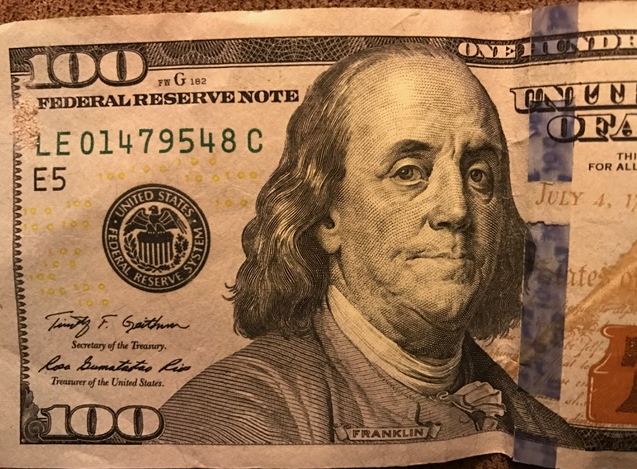
Ben Franklin was an impressive guy. He was one of our Founding Fathers, invented the lightning rod and bifocals (among other things) and was one of the most prominent abolitionists opposing slavery. Needless to say, Ben Franklin was ahead of his time. But, most of this, you already knew.
What you may not have realized was that Ben Franklin was a money nerd, much like myself, whose advice about work ethic and frugality was published for 25 years in a publication known as “Poor Richard’s Almanac.” Now, a collection of his thoughts can also be found in The Way to Wealth.
Even though his words were written in the mid 1700’s, much of his advice impressively applies today, 300 years later.
Here are a few of his originals:
- By failing to prepare, you are preparing to fail.
- Early to bed and early to rise makes a man healthy, wealthy and wise.
- An investment in knowledge pays the best interest.
So, I got to thinking, what if Ben Franklin were around today? What sort of witty tidbits would he share? How, amidst all of the chaos, would he manage to keep his cool and remind us of what’s important?
Via Twitter, that’s how.
Words of Wisdom from Ben Franklin’s Twitter, Probably
1. A Penny Saved is Just a Penny.
In 1737, Ben Franklin famously said “a penny saved is two pence clear.” In 1758, this changed slightly to “a penny saved is a penny got.” Over the course of centuries, this ultimately evolved into “a penny saved is a penny earned.”
The meaning of this maxim is simple: a penny that isn’t spent is a penny that you still have.
But, thanks to inflation, a penny is now meaningless and saving pennies only gets you a few pennies.
Instead of focusing on small wins, like saving pennies, you should focus on big wins. Here’s a refresher of big wins versus small wins:
Big Wins
- Choosing the right job and negotiating a high salary
- Buying a used $20,000 car instead of a new $50,000 car
- Shopping around for the lowest mortgage rate, term and payment
Small Wins
- Buying store brand instead of name brand
- Earning interest on your emergency fund
- Not paying for trading fees on your brokerage account
I have never heard a millionaire say that they made all of their money from credit card rewards points.
2. Education is Priceless. Degrees are Expensive.
We’re living in the information age. Information is free and accessible from anywhere. To plead ignorance is no longer an option.
Don’t know something? Google it.
Meeting someone new? Look them up on LinkedIn beforehand. A little research goes a long way.
Ironically, a formal education has never been more expensive and many degrees are not worth the cost.
3. Everyone is in Sales.
- Your aunt, who is a realtor, says it’s a great time to buy a house.
- Your roommate’s boyfriend, who is an insurance agent, says you need life insurance.
- Your workout buddy, who is a financial adviser, says you should be investing more for retirement.
- Your co-worker, who sells a product through a multi-level marketing company, says you should sign up, too.
The next time you accept someone’s advice, think about their incentives (potential compensation) and biases (why they think the way they do).
4. Something that is free is often the most costly.
A few years ago, Tim Cook (Apple’s CEO) famously said, “when an online service is free, you’re not the customer. You’re the product.” His comments were highlighting Apple’s stance on privacy and decision to not sell your data to the highest bidder.
Here are a few things to consider:
The “Freemium” business model is very popular nowadays. Companies offer basic services for free to 99% of it’s customers while 1% of their customers pay. Those that do not pay, get bombarded with ads.
If the service truly is free, then that company is selling engagement (think SnapChat) which is costly in it’s own right.
Remember, time=money.
5. If you want to be rich, act poor. If you want to be poor, act rich.
My finance professor in college left a lasting impression on me. He made over $200,000 a year, yet he drove a 1985 dodge caravan.
Following his lead, I have adopted a fairly frugal lifestyle. I eat oatmeal for breakfast most days and a peanut-butter and jelly sandwich for lunch. The cars I drive are usually 10+ years old.
Why put money into something that goes down in value?”
Rich people collect assets. Poor people collect liabilities.
6. There’s Always Something Else.
Every dollar that is spent on X could’ve been spent on Y. Time spent doing X is time that could’ve been spent on Y.
This is a simplified explanation of opportunity costs.
The next time you’re about to purchase that expensive purse, Michelle, ask yourself, “What else can I buy with this money?”
If the purse is $2000, that’s $2000 that could’ve purchased 20 pairs of shoes, 111 shares of UnderArmour stock, 200 burrito bowls from Chipotle (plus guac) or $8000 towards your child’s college education ($2k x 7% rate of return x 20 years).
After this quick analysis, I usually find that I would be happier holding onto my money and using it elsewhere.
7. Relationships Can Be Your Biggest Asset and Your Biggest Liability.
When most people think of their biggest assets, they think of (1) their house and (2) their 401(k). This is very elementary thinking.
Your biggest asset is your health and your ability to earn an income. Your second biggest asset is the relationship you have with your significant other. The #1 cause of divorce in America is money. If you are able to get on the same page with your spouse, you become unstoppable. If you fail to communicate and understand each other’s goals and agree on priorities – then you’ll probably become a statistic.